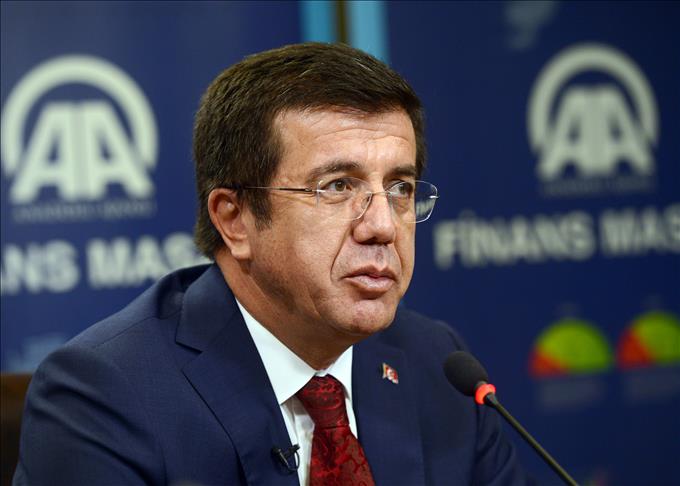
ANKARA
The Turkish Central Bank should cut its key interest rate, Economy Minister Nihat Zeybekci said Friday.
Zeybekci said the cut would be the correct response to the U.S. Federal Reserve’s tighter monetary policy, as the Fed has decided to end its quantitative easing program -- a policy which increases the money supply.
Zeybekci visited the Anadolu Agency's Editor Desk and responded to AA's questions on economic issues in Turkey, as well as on the latest developments in the world economy.
Turkey's government officials have repeatedly criticized the Central Bank for maintaining high interest rates, calling the policy a limiting factor for economic growth.
Zeybekci noted that Turkey’s foreign trade and foreign direct investment largely depend on the European Union.
Nearly 70 percent of international direct investment comes to Turkey from EU countries and nearly half of Turkey’s foreign trade is with the EU.
Zeybekci noted that the European Central Bank president had said: "We will not allow the euro to gain in value."
"As the U.S. moves to a tighter monetary policy, the European Central Bank announced that it can employ quantitative easing and it is doing so at the moment," Zeybekci said.
"At the same time, the European Central Bank cut interest rates three times so far. Contrary monetary movements between the U.S. and the EU are expected. Turkey will be affected by the Fed decision, but the influence of the European Union on Turkey will neutralize the Fed’s influence on the country. So Turkey will be affected positively," Zeybekci explained.
The Turkish Central Bank is concerned that any interest rate hikes in the U.S. might lead to capital outflow from Turkey. "But we will see the opposite of this instead. Both the EU and the Turkish Central Bank do not need to be shy about cutting interest rates."
Zeybekci warned that "international credit agencies do not comment on Turkey’s economic and financial performance; they comment on our political stability and have political motives in their assessments. I do not regard them as credit agencies."
Touching upon the Transatlantic Trade and Investment Partnership, which is a trade agreement currently being negotiated between the EU and the U.S., Zeybekci said: "If Turkey doesn't become a member of the free-trade agreement between the U.S. and EU, or sign a simultaneous free trade agreement with the U.S., it will be impossible for Turkey to maintain its customs union agreement with the EU."
"Oil price reduction increase employment in Turkey"
The fall in oil prices is for Turkey's benefit as it would increase employment and bring economic growth to Turkey, Turkey's Minister of Economy said.
Economy Minister, Nihat Zeybekci, said oil price reduction would double the growth of the Turkish economy.
"With the fall in oil prices, Turkey may grow economically and increase employment in the country. In Turkey we are seeing an economic recovery as our current account deficit decreased by 35 percent," he said.
He added that the decrease on the current account deficit is not because of energy sources. "Energy income will be reflected in Turkey's economy in the last quarter of 2014 and in 2015," he noted.
Brent crude oil prices bounced off its lowest point of around $82 per barrel in four years, and steered between $86-$87 throughout last week, before falling to $84.58 on Monday, and increasing to its highest point, $87.90 per barrel, on Wednesday.
Anadolu Agency website contains only a portion of the news stories offered to subscribers in the AA News Broadcasting System (HAS), and in summarized form. Please contact us for subscription options.


